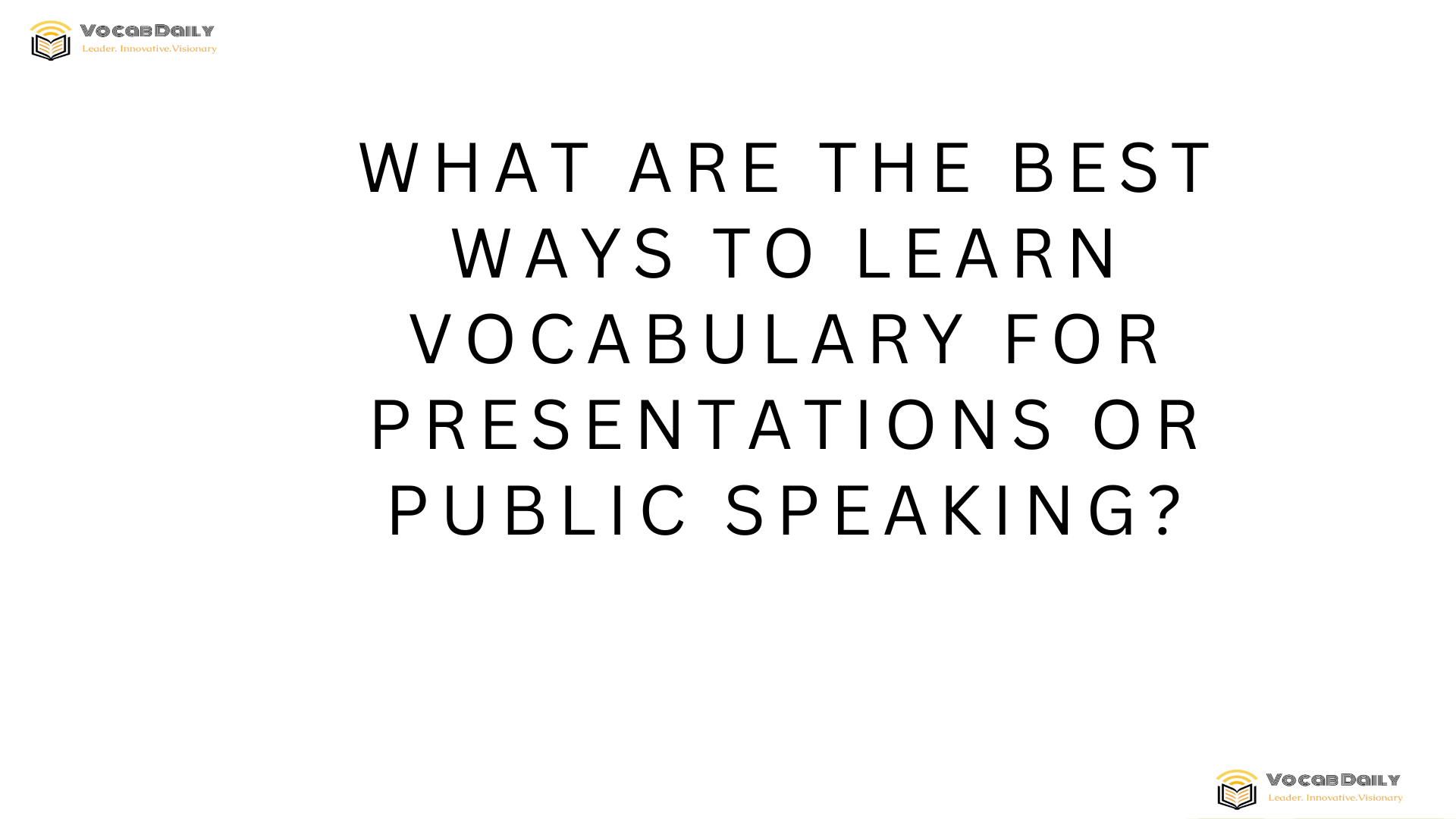What are the best ways to learn vocabulary for presentations or public speaking
Understanding the Importance of Vocabulary in Public Speaking
Having a strong vocabulary plays a crucial role in delivering effective presentations and speaking confidently in professional settings. The right words can clarify your message, engage your audience, and help convey your ideas with precision. Building a rich vocabulary tailored for presentations not only improves your communication skills but also boosts your credibility as a speaker.
Create a Thematic Word List Relevant to Your Topic
When preparing for presentations, one of the best ways to learn vocabulary is to gather words that are specifically related to your topic or industry. Creating a thematic word list allows you to focus on terms that will be most useful during your speech. This practice helps you become familiar with terminology that enhances your authority while also making your message clearer.
Start by identifying key concepts of your presentation, then research relevant words, phrases, and expressions. Include synonyms to avoid redundancy, which keeps your speech engaging. Review and practice these words regularly for better retention.
Use Flashcards and Spaced Repetition Techniques
Flashcards are a tried and tested method to memorize new vocabulary effectively. They allow you to test yourself repeatedly and focus on words that are more challenging to remember. Combine flashcards with spaced repetition techniques, which space out review sessions based on your learning pace. This method optimizes memory retention over the long term.
You can use physical flashcards or smartphone apps designed for vocabulary building. Include a definition, sample sentence, and pronunciation tips on each flashcard to deepen your understanding.
Incorporate New Vocabulary into Practice Speeches
Simply memorizing words is not enough. To truly master vocabulary for presentations, you need to use new words in context. Practice delivering parts of your presentation using the new vocabulary you have learned. This will improve your fluency and help you sound natural rather than rehearsed.
Recording yourself or practicing in front of a peer can provide valuable feedback. When you use new vocabulary actively, it becomes part of your speaking habits, increasing your confidence and effectiveness during actual presentations.
Read and Listen to Professional Speeches and Presentations
Exposure to well-crafted speeches and presentations allows you to see and hear vocabulary in action. Analyze the language used by skilled speakers, noting how they introduce ideas, emphasize points, and persuade their audience. This will expand your vocabulary as well as your understanding of how to deploy it effectively.
Watch TED Talks, business presentations, and keynote speeches on topics relevant to your field. Take notes on unfamiliar words, look up their meanings, and try to incorporate them into your own speaking repertoire.
Engage in Active Vocabulary Exercises
Engage in vocabulary exercises designed specifically for professional settings. Activities such as word-matching games, sentence completion tasks, and vocabulary quizzes sharpen your knowledge and make learning enjoyable. These exercises help reinforce meaning and improve your ability to recall and use words accurately.
Many online platforms offer exercises geared toward business and presentation vocabulary. Consistent practice with these tools will enhance your word usage and keep your skills sharp.
Use Mnemonic Devices to Remember Challenging Words
For vocabulary that is less intuitive or more complex, mnemonic devices can be a powerful learning aid. Mnemonics use patterns, rhymes, or associations to make words easier to recall. For example, linking a term to a visual image or a familiar phrase creates stronger memory connections.
Try creating simple stories or acronyms that relate to your new words. These creative strategies make the learning process more interactive and help ensure that the vocabulary sticks when you’re speaking under pressure.
Join Speaking Clubs or Practice Groups
Engaging with speaking clubs or practice groups creates a supportive environment where you can apply your vocabulary skills. These groups often provide opportunities for impromptu speaking, structured presentations, and group feedback. The real-time interaction helps you think on your feet and become comfortable using professional vocabulary spontaneously.
Organizations like Toastmasters are excellent for learners who want regular practice and constructive critique. The social aspect of these clubs encourages consistent vocabulary use and helps you learn from others.
Leverage Technology and Online Resources
The internet offers a wealth of resources dedicated to vocabulary building for public speaking and professional contexts. Apps, websites, and online courses provide tailored vocabulary lists, interactive lessons, and pronunciation guides. Utilizing modern technology gives you access to learning tools anytime and anywhere.
Look for resources that focus on business English, presentation skills, and public speaking vocabulary. Many platforms offer tracking features that monitor your progress and suggest personalized learning paths.
Record and Review Your Vocabulary Usage
One of the best ways to enhance vocabulary retention is through self-recording. When you record yourself practicing, you can listen back to identify areas where vocabulary use is strong or needs improvement. This practice fosters self-awareness and allows you to refine pronunciation, intonation, and word choice.
Regularly review your recordings and update your vocabulary list based on common mistakes or gaps. Over time, you will notice greater ease and confidence in your presentations.
Set Realistic and Measurable Vocabulary Goals
Setting specific goals for vocabulary learning helps maintain motivation and track progress. For example, aim to learn and use 10 new presentation-related words each week or include three new phrases in your next speech. Clear goals enable you to plan your study routine more effectively and celebrate small victories.
Writing down goals and regularly revisiting them ensures you stay on course. Combine goal-setting with rewards to keep the learning process enjoyable and consistent.
Also check out VocabDaily workbook collections.

Leave a Reply